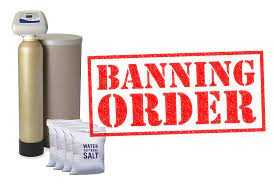California has led the country in a movement to ban salt-based water softeners — with states like Texas, Michigan, and Connecticut following suit. So, why did California state legislators decide to ban these popular water softeners when they were widely used around the state to soften the notoriously hard water found in California? Here’s everything you need to know about California’s ban on salt-based water softeners:
Salt-Based Water Softeners Explained
Our water is filled with calcium and magnesium molecules that make the water hard if we don’t incorporate water softeners into our water systems. If softeners are not applied, the hard water will cause problems in our homes by wearing down fixtures and appliances quickly due to ‘soap scum.’ Soap scum is produced because the materials in hard water do not react well with soap — therefore causing unwanted build-up.
Water softeners function through ion exchange principles (hence the term ion exchange water softeners). Essentially, the water passes through the softener, which is a layer of resin beads. These resin beads contain sodium that replaces the calcium and magnesium molecules that make the water hard. So, sodium and chlorine end up going down the drain and into our wastewater system.
Negative Effects on Agriculture
Agriculture plays a vital role for Californians and people around the world. According to Pacific Research Institute, California is responsible for 11 percent of total agricultural sales in the United States, the largest share of any state. California’s agricultural sector is a solid and essential component of the state’s economy and national and global food production. Dr. Amy Kaleita of the Department of Agricultural and Biosystems Engineering at Iowa State University stresses the importance of water’s relationship with agriculture in California.
“Protecting and enhancing California’s agricultural sector and encouraging innovation in water conservation provides benefits not only to farmers but to the population as a whole.”
United Nations Food and Agriculture Organization reports that sodium and chloride have a detrimental effect on plants trying to grow. Fruits are the most affected by these elements found in water because of salt-based water softener usage. When someone utilized a salt-based water softener in California, the salt and chlorine would go down the drain, through the waste stream, and into our groundwater through the generation cycle.
So, farmers in California had difficulties growing onions or tomatoes (two foods with the lowest tolerance for sodium) because the elements in the water would cause them to become damaged and/or die.
According to California’s state figures, the amount of cropland taken out of production because of overly salty soil could fill an area the size of San Francisco eight times over. That’s not all — a much larger area has been negatively affected by soil contamination.
California legislators understood the importance of the agricultural economy in the state, so they were compelled to ban salt-based water softeners after farmers reported trouble with the water on their farms. The alarming statistics speak for themselves. California could simply not afford to lose any more farmland due to salt-based water softeners when there are salt-free options readily available. If salt-water softeners were not banned in California, we would see a significant decline in the amount of produce available in supermarkets around the country.
The Economic Impact
While the environmental impact of salt-based water softeners is undeniable, so is the economic impact. Daniel Cozad, the executive director of the Central Valley Salinity Alternatives for Long-term Sustainability initiative in California state, spoke to California Sun about the financial implications of salt-based water softeners inserting unnecessary salts into the state’s water supply.
“People in general in California don’t think about salinity as an issue, but soil scientists and crop advisers think about it all the time. It just slowly erodes the economic value of the water and the economic value of the land.”
Researchers at Carnegie Mellon University found that excess soil salinity in the Central Valley (which consists of most of the state’s farmland) reduced crop yields by 8 million tons per year — totaling a loss of approximately $3.7 billion.
California’s Ongoing Struggle With Water Issues
It’s no secret that California has a history of drought and water shortages. So when water that would’ve been otherwise useable became contaminated due to salt-based water softeners previously being used throughout the state, significant issues arose. California legislators were pushed to ban these water softeners because they made the ongoing water crisis in California significantly worse.
Salt-Free Water Softener Systems
Lawmakers, politicians, environmentalists, farmers, and consumers alike felt the need to ban water softeners because of the detrimental economic and environmental impacts. The excess salt was problematic in many ways for a state that already struggled with water issues.
If you’re looking for a salt-free water softener that is eco-friendly and has proven results, check out our products here. You deserve to drink water that still has beneficial minerals without harming the environment. Be smart with your filters by understanding that each household makes an impact when choosing a water filter. We only have one planet — so let’s take care of it the best we can!






